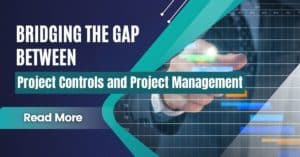Summary:
I get this question a lot, “What is the Difference Between Project Controls and Project Management?”. I believe there are 3 key differences between Project Management and Project Controls:
1- Project Control is a subset of Project Management with the primary focus of managing the project’s cost and schedule.
2- Project Manager is directing the work of the project team while the Project Controller advises the team and the Project Manager of possible cost & schedule issues/ recovery plans.
3- Project Controller generates the project’s cost/ schedule information while the Project Manager consumes the information generated and makes decisions for the project.
Watch this video for the full lesson, so you know why Project Controls is different from Project Management.
Like this episode? Please share it so others can also benefit from it.
Download the free audio mp3 podcast of this episode on iTunes.
Want more training? Subscribe to Project Control Academy to receive complimentary training videos and resources delivered to your mailbox.
Project Control Quotes to Consider: Join Project Control Academy on Instagram for tons of great quotes.
Video Transcript:
I get this question a lot, “what is the difference between Project Controls and Project Management?” I decided to put together this training for you so I can provide you the exact difference between these two functions, Project Controls and Project Management. But I’m wondering, is that your question too?
Are you wondering if Project Controls is the same as Project Management?
Do you think Project Controls is about controlling the quality of a project?
Do you think Project Controls is about controlling and managing the people in a project?
Well, the answer is a big fat “NO.” Project Controls is not the same as Project Management; it is not about controlling the quality or monitoring and managing people in a project.
You may be wondering, if Project Controls is not either of those, what Project Controls is all about?
What does Project Controls control in a project?
To answer your question, Project Controls control two primary factors in a project. One is “cost,” and another is “schedule.”
A Project Controller answers two fundamental questions in a project;
- How much the project is going to cost and whether or not we’re going to finish on the budget?
- How long is the project going to take? Where are we now in our project? … Are we going to finish on time or not? …If not, what we can do about it?
That’s it! That’s what a Project Controller does; managing cost and schedule in a project.
Now, let’s see what a Project Manager does in a project.
I like this definition from Wikipedia about Project Management:

“Project management is the discipline of initiation, planning, execution, monitoring, and controlling, and closing of the work of a team to achieve specific goals and meet specific success criteria.”
So, if project management is about initiation, planning, execution, monitoring, and controlling, and closing in a project, then where do you think the Project Control role exists in this cycle? Does it involve only during the monitoring and controlling phase of a project?!
There is a very common misconception about Project Controls. Since there is a “control” word in “Project Controls,” people might think that Project Controls is only about controlling and managing a project and a Project Controller only involves the monitoring and controlling stage of a project.
The reality is…..
The Project Control team needs to be involved in the project from its initiation stage all the way to the closeout stage to ensure a successful project control implementation in the project.
You might be wondering why Project Controls needs to be involved early on in the project; from the initiation stage, for example?
When you put together a proposal at the initiation stage of a project, don’t you need to come up with an estimated overall budget on how much this project is going to cost and what is the high-level delivery schedule for your project?
Who is in charge of the cost and schedule of a project?
Yes, a Project Controller.
Project Controller needs to be involved early on in the project from the initiation stage when you put together a proposal. As you start a project in the planning stage, the Project Controller helps you with the planning of the cost and schedule portion of the project. When the project goes through its life cycle, the Project Controls team gets involved in different aspects of costs and schedule management in the project. Project Controls have heavy involvement throughout the entire project lifecycle.
With that, you might be thinking, “Okay, then what’s the difference between a Project Controller and a Project Manager?”
The difference between the Project Controller and the Project Manager goes back to the definition of the role of a Project Controller who defines two primary factors in a project; cost and schedule.
Did you know that one of the primary responsibilities of a Project Manager is managing the constraints in a project to achieve the end result and the objective of a project? Do you know what those primary constraints are in a project?
 Yes, the main constraints are “scope,” “cost,” “time,” and “quality.” One of the big challenges of a Project Manager is to create a balance between these constraints in a project.
Yes, the main constraints are “scope,” “cost,” “time,” and “quality.” One of the big challenges of a Project Manager is to create a balance between these constraints in a project.
Guess who is there to help the Project Manager to manage the cost and time element of a project.
Yes, a Project Controller.
If you are not yet convinced about the difference between the Project Management and Project Controls, let me give you a simple analogy so you can relate to.
If you consider a project as a ship, the role of a Project Manager in a project is like a “Captain” of a ship, leading the whole ship toward its final destination that is determined by the project owner.
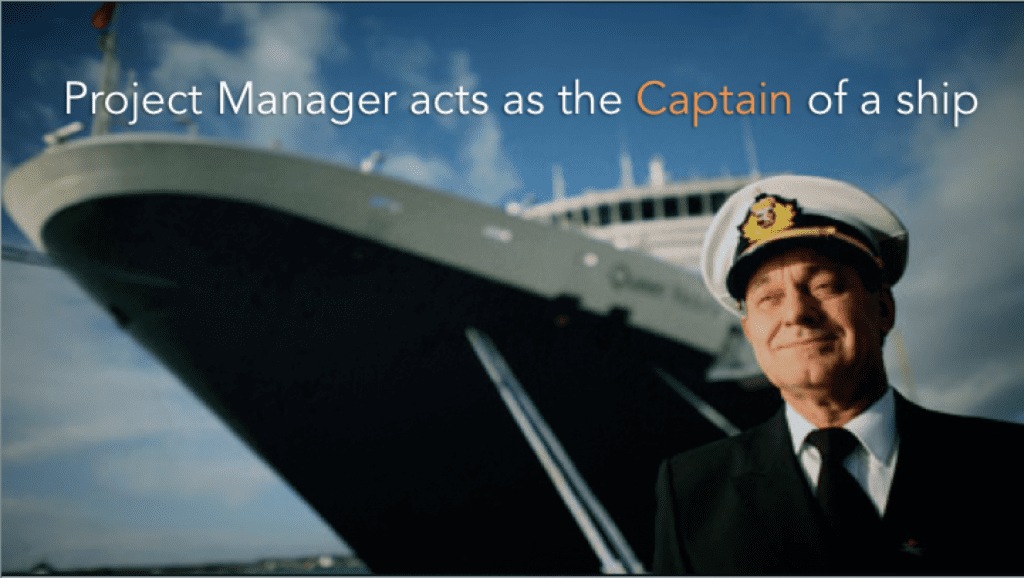
Now with that analogy, what do you think the role of a Project Controller would be?
The Project Controller would act similar to a “navigating officer” in a ship. Just like a navigating officer who keep control of the course, speed, and variation of the ship; where it is and where it’s heading to, the same applies to a Project Controller in a project.
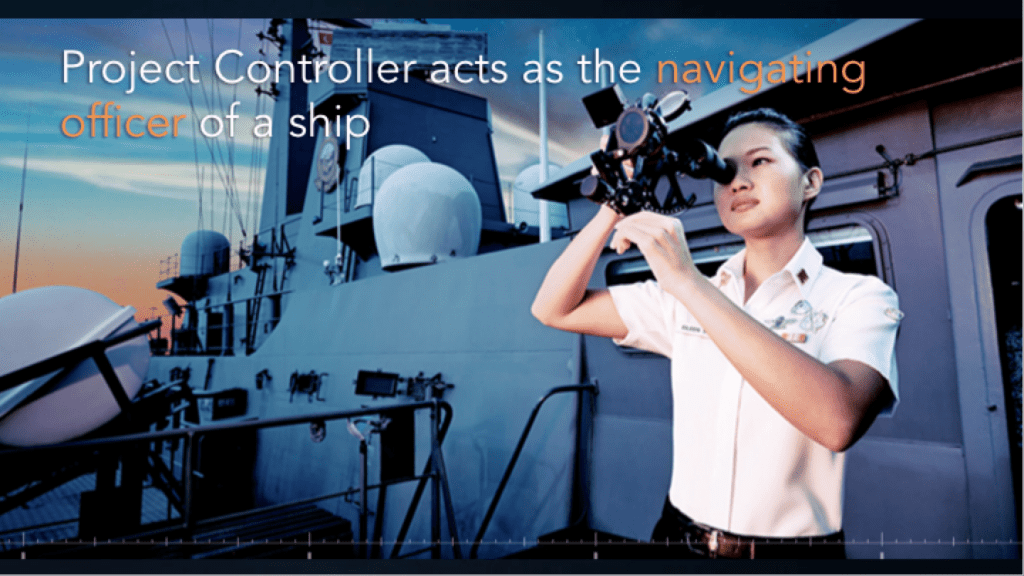
The Project Controllers keep an eye on the cost and schedule portion of the project. First, they come up with a plan on how they are going to carry the ship to its final destination. So first, they come up with a plan, they come with a road map.
As they start their journey, they start measuring where they are in their course of their journey and how much they are deviating from their plan.
Remember, I’m just talking about cost and schedule. The only portion of the project scope that the Project Controller is controlling is the project’s cost and schedule. Therefore, they come up with a plan for the project’s cost and schedule.
Throughout the course of the project, the Project Controllers make sure that they manage and control these two elements; cost & schedule. And if there’s any deviation, they advise the project team on what they can do and what a recovery plan could be, similar to what a navigation officer does in a ship.
Project Controls vs. Project Management in an Organizational Chart
To gain more clarity on the distinction between Project Management and Project Controls, let me show you an organization chart so you can compare the position of a Project Controller vs. the Project Manager.
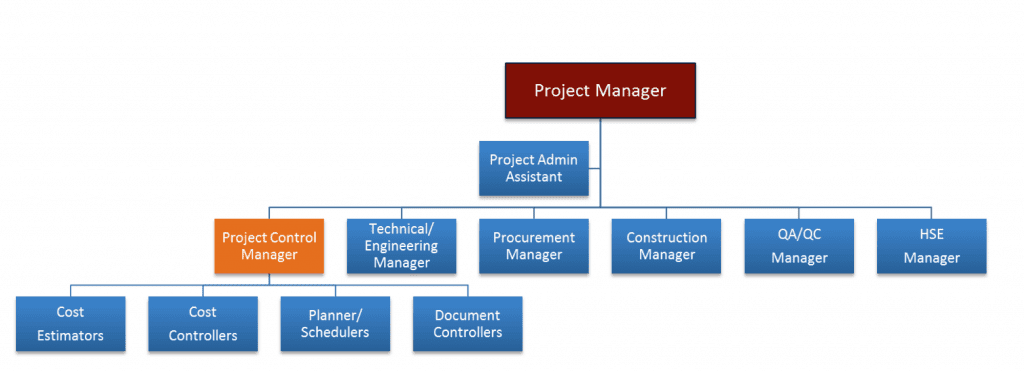
Here is a typical organizational structure for an EPC project (Engineering, Procurement, Construction Project), where, you see Project Manager on the top and different teams underneath the Project Manager.
For example, you will have HSE Manager, QA/QC Manager, and Construction Manager. Each manager will have their own team of people underneath them. For example, if you have technical engineering manager demonstrated as a box in the org, chart, you will have different boxes underneath that. For example, it might be electrical engineers, process engineers, instrumentation engineers and so on. Therefore, they will have their own team shown as separate boxes in the org chart. I haven’t shown those because I just wanted to show you the difference between Project Controls and Project Management.
Going back to the technical manager, let’s say, electrical engineers, as part of the team, their main concern is the design and control of the electrical scope portion of the project. But when we are talking about Project Controls, again, their scope is project’s cost and schedule.
The Project Control Lead/Manager would have his/her own team. Usually, you might see the team of Cost Estimators, Cost Controllers, and Planner/Schedulers. Some companies might have Document Controllers also under Project Controls.
According to the size and complexity of a project, the number of Project Controllers assigned to a project varies. For example, if you are working on a big major project, you might see several people working underneath the Project Control Lead/ Manager. If there’s a small project, then one or two people might undertake the roles of several Project Controllers.
Regardless of the size of the Project Control team in a project, the Project Control Lead/Manager reports directly to the Project Manager, and the Project Control team interacts directly with all the other team members in the project.
The Interaction of Project Controls Team with the Project Team Leads
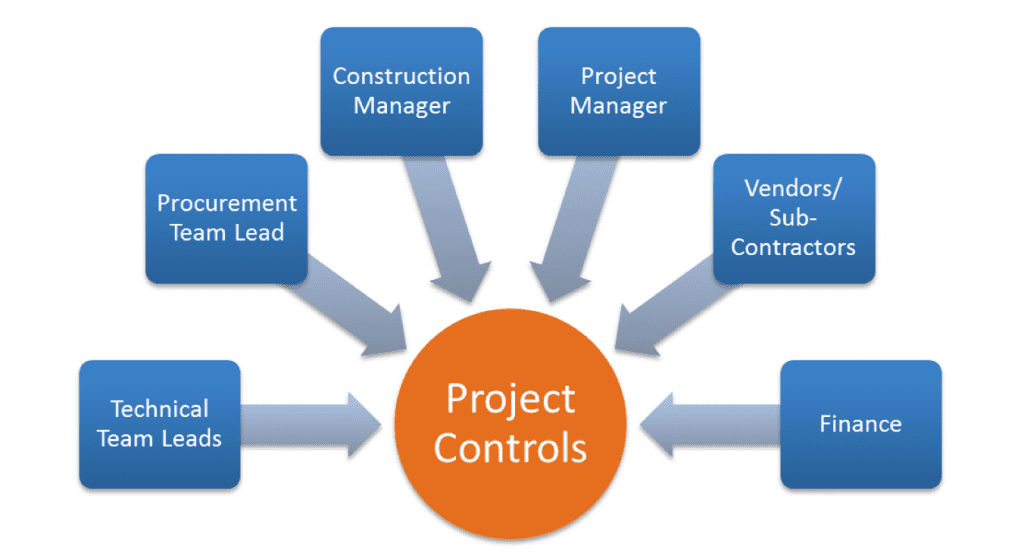
Project Control team get information from technical team leads, procurement, construction, project manager, vendors, sub-contractors, client, finance department … you name it.
Since Project Controllers take control of the entire cost and schedule of the project, they need to know for example how much the budget of the electrical engineering team is in the project, how they are performing against that budget, and when they are delivering their key milestones and deliverable. Therefore, they keep the control and management of the cost and schedule portion of the entire project. To do so, they need to have interactions with almost all team members.
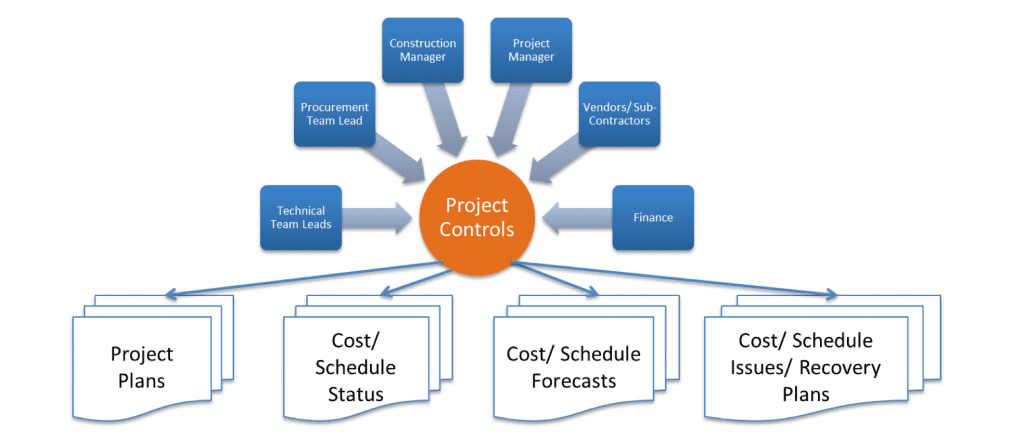
Project Controls team analyzes the data received from the project team members and develops Project Plans, which usually includes:
- Project Cost Estimate
- Project Budget
- Budget allocation
- Resource Plan
- Project Schedule
- WBS/ CBS
- Cost/ Schedule Contingency Plan
Once the project’s cost and schedule are developed, the Project Control team gets constant inputs from the project team and generate different kinds of analytical reports such as:
- Project Cost and Schedule status and performance
- Project Cost and Schedule forecasts
- Project Cost and Schedule issues/ concerns/ recovery plans
All of this information is reflected back to the Project Manager and the project team members so they can make right decisions for the project.
It is the Project Control function in a nutshell.
If you want to learn more about how project control controls a project, make sure you watch another episode of Project Control Mastery, where I discuss “How a Project Controller Controls a Project?”
Summary:
To summarize there are three fundamental differences between Project Controls and Project Management.
One of the key differences is that Project Controls is a subset of Project Management, a function under Project Management, with the primary focus of managing the project’s cost and schedule.
Another key difference between the Project Manager and the Project Controller is that Project Manager is directing the work of the project team while the Project Controller advises the team and the Project Manager of possible cost & schedule issues/ recovery plans.
The Project Controller acts as an advisor, who provides recommendations to the project management and advise the team on different strategies and recovery plans to bring the project’s cost & schedule back on track. The Project Controller provides information, graphs, data, and reports that show where the project is, where the project is heading to, and what we can do about the project’s cost and schedule status. So the Project Controller only acts as an advisor. He/she doesn’t tell the project team members what to do. Instead, advise the team of the possible strategies and solutions.
Another key difference between Project cControls and Project Management is that Project Controller generates the project’s cost/schedule information while the Project Manager consumes the information generated and makes decisions for the project.
Therefore, the Project Controller is not in a position of making decisions for the project. He/she provides the information to the project manager and the team. Based on the information provided and based on his or her suggestions, the project manager makes a decision for the project.
If you have any question about this post, please make sure that you submit your questions or comments down below, I would be glad to assist you and answer your questions. And if you like this training, make sure that you hit the like button and share it with the group of your friends or colleagues.
About the Author, Shohreh Ghorbani

Shohreh is a licensed project management professional (PMP) recognized by Project Management Institute (PMI) and holds a Master of Science in Industrial Engineering.
Connect with Shohreh via Facebook, LinkedIn, Instagram, YouTube





![[Free 90-min Masterclass] The Ultimate Leadership Recipe for Project Professionals](https://www.projectcontrolacademy.com/wp-content/uploads/2024/08/4-1024x576.jpg)















